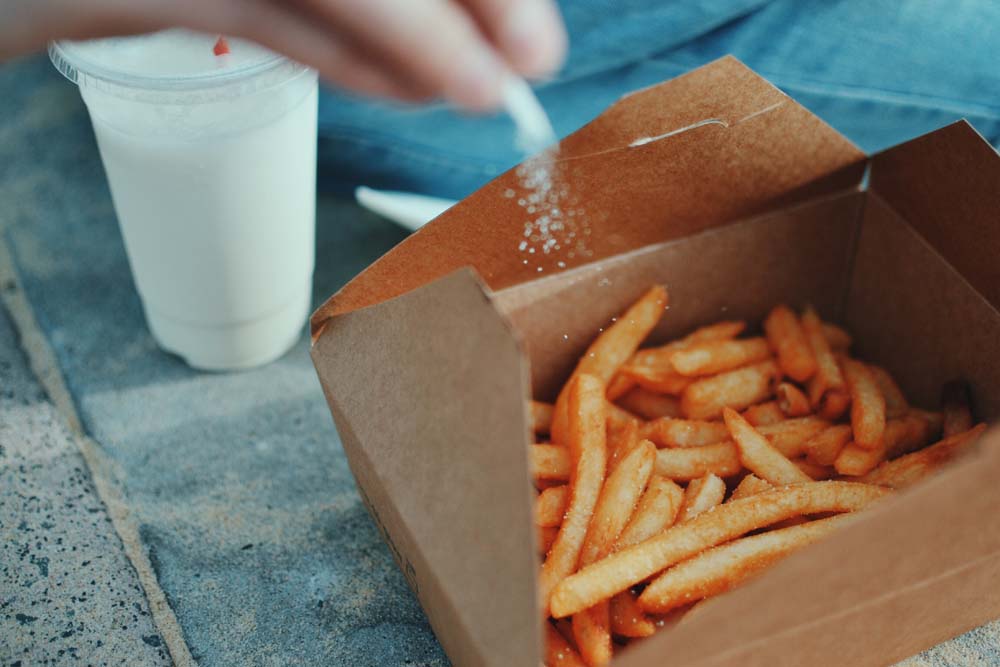
Top 5 foods to avoid that can cause belly bloat
1. Junk foods
The combination of fat, sugar, and lots of sodium (salt) can make junk food tastier to some people. But diets high in sodium can lead to water retention, which is why you may feel puffy, bloated, or swollen after eating these foods. These fatty foods also take longer to digest which allows gas to build up, causing bloating (NHS 2022).
2. Carbonated drinks
The fizz in carbonated drinks (even diet ones) can cause gas to get trapped in your belly which can cause wind, belching and bloating. These drinks can also be very high in sugar.
3. Artificial sweeteners
They contain chemical compounds called sucralose, aspartame, and cyclamate that the digestive tract cannot break down easily, which can lead to bloating. Sweeteners, which can be up to 300 times sweeter than natural sugar, are known to increase appetite and result in overeating.
4. Gassy foods
Some vegetables and other foods produce more gas than others such as brussel sprouts, cabbage and certain beans. This doesn’t mean you have to ditch them completely but think about limiting the amount you eat at one time. Be mindful of how these foods make you feel.
5. Salt
A study has found that reducing salt intake can be helpful in preventing bloating. Salt causes your body to retain water, predominantly around your abdomen. Not all bloating is a result of gas. Sometimes it is water retention, which salt exacerbates. In some ways, water retention is even harder to alleviate than gas, so it is important to avoid high-salt food. Surprisingly, salt is hidden in many processed foods such as sauces, salad dressing and other condiments. Be sure to always read the labels on foods before you buy them (Lacy and Gabbard et al 2011 ; NHS 2022).
References
Barrett, J. S., & GIbson, P. R. (2007). Clinical ramifications of malabsorption of fructose and other short-chain carbohydrates. Practical Gastroenterology, 31(8), 51. Available at: https://www.researchgate.net/publication/279897105_Clinical_Ramifications_of_Malabsorption_of_Fructose_and_Other_Short-chain_Carbohydrates
Hicks, C. S., McLester, C. N., Esmat, T. A., & McLester, J. R. (2017). A comparison of body composition across two phases of the menstrual cycle utilizing dual-energy x-ray absorptiometry, air displacement plethysmography, and bioelectrical impedance analysis. International journal of exercise science, 10(8), 1235. Available at: https://www.ncbi.nlm.nih.gov/pmc/articles/PMC5786198/
Hale, G., Bievre, M., & Hughes, C. (2000). Exploring the role of progestins and phytoestrogens in menopause. Integrative Medicine, 2(2-3), 133-141. Available at: https://www.researchgate.net/profile/Claude-Hughes/publication/12435999_Exploring_the_role_of_progestins_and_phytoestrogens_in_menopause/links/5f21be50458515b729f3141f/Exploring-the-role-of-progestins-and-phytoestrogens-in-menopause.pdf
Hunt, R., Quigley, E., Abbas, Z., Eliakim, A., Emmanuel, A., Goh, K. L., … & LeMair, A. (2014). Coping with common gastrointestinal symptoms in the community: a global perspective on heartburn, constipation, bloating, and abdominal pain/discomfort May 2013. Journal of clinical gastroenterology, 48(7), 567-578. Available at: https://journals.lww.com/jcge/fulltext/2014/08000/Coping_With_Common_Gastrointestinal_Symptoms_in.4.aspx
Lacy BE, Gabbard SL, Crowell MD. Pathophysiology, evaluation, and treatment of bloating: hope, hype, or hot air? Gastroenterol Hepatol (N Y). 2011 Nov;7(11):729-39. PMID: 22298969; PMCID: PMC3264926. Available at : https://pubmed.ncbi.nlm.nih.gov/22298969/
Liong, M. T. (2007). Probiotics: a critical review of their potential role as antihypertensives, immune modulators, hypocholesterolemics, and perimenopausal treatments. Nutrition reviews, 65(7), 316-328. Available at: https://academic.oup.com/nutritionreviews/article/65/7/316/1806993?login=false
Naseri, M., Babaeian, M., Ghaffari, F., Kamalinejad, M., Feizi, A., Mazaheri, M., … & Adibi, P. (2016). Bloating: Avicenna’s perspective and modern medicine. Journal of evidence-based complementary & alternative medicine, 21(2), 154-159. Available at: https://journals.sagepub.com/doi/full/10.1177/2156587215622915
NHS (2022) Bloating. Online. Available at: https://www.nhs.uk/conditions/bloating/
Ringel-Kulka T, Palsson OS, Maier D, Carroll I, Galanko JA, Leyer G, Ringel Y. Probiotic bacteria Lactobacillus acidophilus NCFM and Bifidobacterium lactis Bi-07 versus placebo for the symptoms of bloating in patients with functional bowel disorders: a double-blind study. J Clin Gastroenterol. 2011 Jul;45(6):518-25. Available at: https://pubmed.ncbi.nlm.nih.gov/21436726/
Slavin, J. (2010). Whole grains and digestive health. Cereal Chemistry, 87(4), 292-296. Available at: https://onlinelibrary.wiley.com/doi/abs/10.1094/CCHEM-87-4-0292


